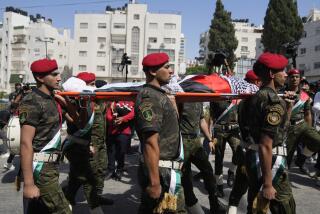Bulldozer driver testifies in Israeli trial over Rachel Corrie’s death
- Share via
Reporting from Haifa, Israel — The bulldozer driver who crushed to death American activist Rachel Corrie seven years ago struggled Thursday just to recall her name.
“It’s Rachel-something,” he testified in a Haifa courtroom. “Carrie?”
The former Israeli reservist’s courtroom appearance, his first public comments since the college student’s 2003 death, was expected to be the dramatic climax of the Corrie family’s long-running civil lawsuit against the Israeli government. But during more than four hours of testimony, the 38-year-old Russian immigrant, speaking from behind a screen to hide his identity, said he remembered little about that day and the young woman he ran over.
He said he thought she was American. But he noted that he never followed the news coverage of Corrie’s death and only learned six months ago that he would have to testify in the family’s wrongful-death lawsuit.
The Israeli government has maintained that Corrie and her fellow international activists were responsible for the incident, saying protesters entered a “war zone” and put themselves at risk by attempting to prevent Israeli demolitions of Palestinian homes in the Gaza Strip. A military inquiry concluded that no disciplinary actions should be taken against the driver, who now works as an equipment supervisor for an Israeli food company.
The driver insisted that he never saw the 23-year-old Washington state resident until her friends rushed over to dig her body out of the dirt. He said he couldn’t remember the time of day when his bulldozer rolled over Corrie and then backed up over her a second time.
The Corrie family’s attorney, Hussein abu Hussein, prodded the man’s memory. Perhaps you recall someone fitting her description? She was about 5 feet, 8 inches and 140 pounds, the attorney said. Fair-skinned. Attractive. Wearing a bright orange safety jacket?
The reservist, identified only as Y, responded: “I don’t remember. I saw all kinds of people.”
Corrie’s parents, Craig and Cindy Corrie, said his vague, sometimes flippant responses were hard for them to take.
“He sounds like he has not given much thought to this in the past seven years,” said Cindy Corrie, her voice cracking slightly and tears welling up in her eyes. “That’s hard to hear, since for us, Rachel is in every day, every hour, every moment. How could you not remember the time of day? If I killed somebody, I would surely know when it happened.”
It’s not that the family expected the driver’s testimony would bring comfort or solace, Corrie said. But for years the family has anticipated — and simultaneously dreaded — the day when they would finally hear directly from the man who ran over their youngest child.
“It’s hard to articulate why it’s something the family needs,” said Rachel’s sister, Sarah Corrie Simpson. “It just is. Ultimately it comes down to my sister and the individual on the other side of this act, looking at us in the eye and telling his story.”
At the government’s request, the bulldozer driver was visible only to the judge and attorneys. State prosecutors said the former soldier’s life could be at risk if he were identified publicly.
The Corries requested that they also be allowed to see the driver, but the judge turned them down.
The courtroom partition covered everything except a fidgety pair of brown leather tennis shoes, sprouting from the gap at the bottom. New Balance, about size 9. For most of the day, those brown shoes rested stiffly on their toes. But when questioning got tense, they would tap and shift.
The Corries’ attorney pressed the driver about what the lawyer called inconsistencies in the man’s testimony regarding the size of the blind spot in the bulldozer cabin, how he first learned that Rachel Corrie had been run over and whether he once admitted to having seen the young woman climbing atop the dirt mound in front of him.
But during his testimony, the driver insisted that he never saw Corrie and didn’t realize there was a problem until he saw other protesters waving frantically, rushing toward his bulldozer and taking pictures of him.
Other witnesses said the driver must have seen Corrie, who had been protesting in the area for hours, was wearing a fluorescent jacket and was struck in a flat grassy field.
The driver said he and other soldiers had been warned that day that foreign activists were protesting at the site and had been told to exercise caution. When asked by the Corries’ attorney why he did not suspend his work until the civilians had been removed, he replied: “We just did our job. Those were our instructions.”
Cindy Corrie questioned whether the screen, which she called “dehumanizing,” was intended to protect the driver’s security or to allow him to avoid facing the family.
“They don’t want him to have to look at us,” she said. “That’s the point, isn’t it? The state is protecting soldiers from having to come face to face with the acts they committed and the people they’ve impacted. Israel is hiding behind that screen.”
More to Read
Sign up for Essential California
The most important California stories and recommendations in your inbox every morning.
You may occasionally receive promotional content from the Los Angeles Times.










